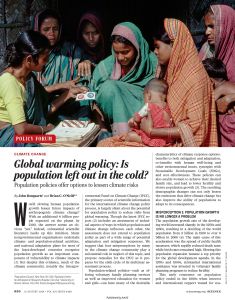Join getAbstract to access the summary!

Join getAbstract to access the summary!
John Bongaarts and Brian C. O'Neill
Global Warming Policy: Is Population Left Out in the Cold?
Population policies offer options to lessen climate risks
Science, 2018
What's inside?
Population policies are a sensitive topic but are important weapons in the fight against climate change.
Recommendation
Population growth has a significant impact on the climate. Yet population policy is a sensitive topic, tinged with bad press and mixed feelings about enforcement, especially with regard to family planning programs. This has led to the neglect of population control as a means to help with the worldwide effort to combat climate change. In this article, John Bongaarts from the Population Council and Brian C. O’Neill from the National Center for Atmospheric Research do away with some popular misconceptions around population policy and make a strong case for putting it back on the agenda of the climate change community.
Summary
About the Authors
John Bongaarts is a demographer and Vice-President and Distinguished Scholar at the Population Council. Brian C. O’Neill is an earth system scientist and professor at the University of Denver. He also serves as director of research at the Korbel School’s Pardee Center for International Futures.

















Comment on this summary